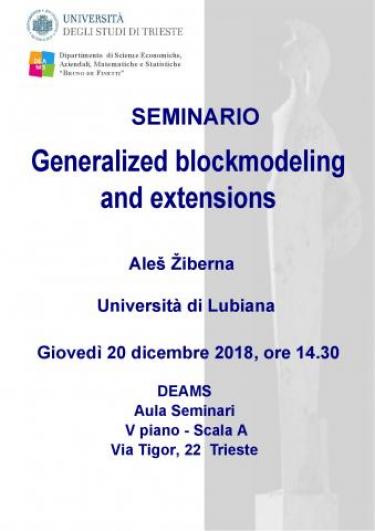- Home
- Dipartimento
- Ricerca
- Didattica
- Corsi di laurea
- Corsi di studio
- Informazioni agli studenti
- Elenco insegnamenti - Programmi d'esame
- Archivio Elenco Insegnamenti - Programmi
- Orario delle lezioni e Calendario didattico
- Bacheca appelli Guida Online
- Calendario lauree
- Informazioni specifiche Calendario lauree
- Segreteria studenti
- Bandi
- Collegio universitario Luciano Fonda
- Mobilità internazionale
- Premi di studio
- Orientamento
- Sbocchi professionali
- Stage e tirocini
- Modulistica di Ateneo
- Post Lauream
- Servizi e strumenti
- Trasferimento della conoscenza
Seminario “Generalized blockmodeling and extensions”
Tipologia evento:
home
Sede:
Trieste
RELATORE: Prof. Aleš Žiberna - Università di Lubiana
ABSTRACT
“Generalized blockmodeling and extensions (with emphasis on blockmodeling linked networks)”.
The talk will start with the introduction to blockmodeling (a method for partitioning networks). Then generalized blockmodeling including blockmodeling of valued networks and pre-specified blockmodeling will be covered.
In the main part of the talk, blockmodeling of multilevel or linked network data will be presented. Multilevel network data consist of networks that are measured on at least two levels (e.g. between organizations and people) and information on ties between these levels (e.g. information on which people are members of which organizations). Several approaches are possible: a) separate analysis of the levels; b) transforming all networks to one level and blockmodeling on this level using information from both/all levels; c) truly multilevel approach, where both/all levels and ties between them are modeled at the same time. Here we will focus on the last approach.
The approach was initially developed within generalized blockmodeling. However, for larger networks (several hundred units), this approach is not appropriate. Therefore, algorithms for multilevel blockmodeling based on k-means approach (and possibly stochastic blockmodeling) will also be discussed.
In addition (time permitting), use of the same procedure for blockmodeling networks in several time points will be presented. This procedure is especially useful for blockmodeling networks in a few time points where we want the groups from different time points to be connected, while not necessary the same, especially when not all units are present in all time points.
Depending on interests and time, several extensions could be discussed, which include blockmodeling of sparse networks, stochastic blockmodeling for linked networks and multirelational blockmodeling.
Luogo:
DEAMS - Aula Seminari, Via Tigor n. 22 - V piano, scala A
Promotore:
DEAMS - prof.ssa Susanna Zaccarin
Ultimo aggiornamento: 18-12-2018 - 13:18



